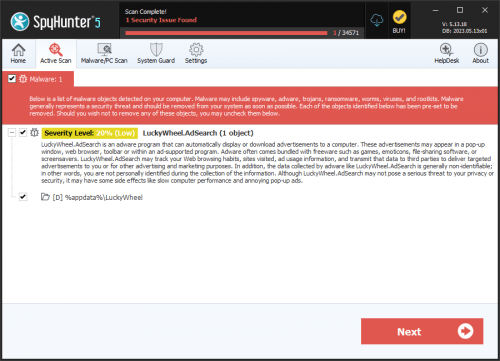LuckyWheel
After analyzing LuckyWheel, it was discovered that the software's primary purpose is to display unwanted and disruptive advertisements. Due to this behavior, it has been classified by cybersecurity researchers as adware. It is worth noting that many users unwittingly download and install adware on their devices, not realizing that the software generates ads.
Keeping Adware Like LuckyWheel may Lead to Privacy Issues
Adware such as LuckyWheel displays various types of advertisements when installed and running on a computer. However, users should be cautious of advertisements displayed by adware as they can often be misleading or deceptive. Adware applications may be responsible for showing different kinds of advertisements, including pop-ups, banners, and other forms that may promote fake products or services. They contain unreliable links or downloads or trick users into revealing their personal information.
Clicking on these advertisements may lead to destinations promoting intrusive PUPs (Potentially Unwanted Programs), phishing attacks or other online tactics. Therefore, it is crucial for users to avoid interacting with ads displayed by adware and remove the adware from their system as soon as possible.
It also is worth noting that adware is often regarded as a nuisance and can negatively affect a computer's performance and interfere with the user's browsing experience. Additionally, adware applications often have the ability to collect user data and information, which can raise privacy concerns.
Users Rarely Install PUPs and Adware Intentionally
Users rarely install PUPs and adware intentionally due to the questionable distribution methods used by these types of applications. These programs are often bundled with legitimate software or disguised as helpful tools, such as browser extensions or system cleaners, and distributed through deceptive methods, such as fake software updates or misleading download links.
Users may unknowingly install PUPs and adware when they rush through installation processes without reading the terms and conditions or when they do not uncheck pre-selected checkboxes that authorize the installation of additional software.
Additionally, PUPs and adware may be distributed through unsafe advertisements, fake alerts or warnings, and phishing emails that lure users into downloading or installing the programs. These tactics exploit users' trust in legitimate software and websites to trick them into downloading and installing unwanted programs.
In summary, the deceptive and misleading distribution methods used by PUPs and adware make it difficult for users to identify and avoid them, leading to unintentional installations and negative consequences, such as unwanted advertisements, slowed performance and privacy issues.


